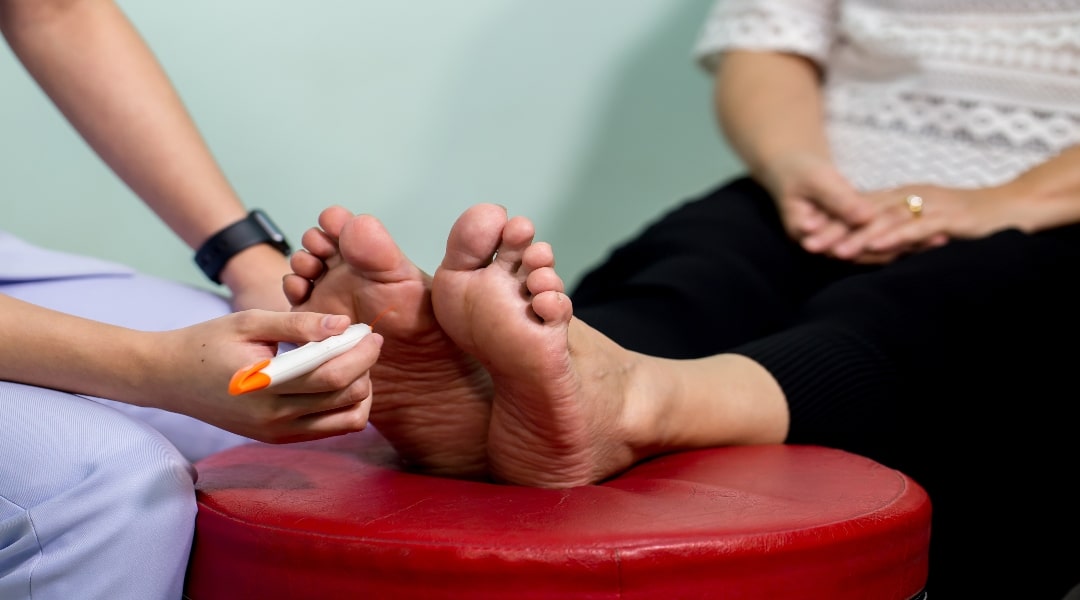Neuropathy Can Be Reversed
Do you feel that? That uncomfortable pins and needles sensation in your feet or hands? It could be a sign of neuropathy, a condition affecting the body’s outer nerves. You might be feeling hopeless and thinking that this is the new norm. However, we are here to tell you that neuropathy can be reversed! Read on to learn more about neuropathy, its causes, symptoms, and treatments.
What is Neuropathy?
Peripheral neuropathy is a blanket term that describes damage to the body’s outer nervous system. Nerves outside the brain and spinal cord, known as sensory, motor, and autonomic nerves, are affected by the condition.
Neuropathy can be caused by a wide variety of medical conditions and affect one or multiple areas of the body. The feet are a common site of neuropathy symptoms, as are the hands and arms.
What Causes Neuropathy?
Neuropathy is a symptom of an underlying condition, rather than a disease in itself. On a basic level, it occurs when the protective outer coating of a nerve, called the myelin sheath, is damaged. As a result, nerves can’t send signals correctly, leading to the symptoms of neuropathy.
Here’s a deeper look into the various causes of the condition:
Diabetes
Diabetes is a chronic health condition in which the body can’t regulate its blood sugar levels. Poorly managed diabetes can lead to nerve damage; it’s estimated that up to 70 percent of people with diabetes will eventually develop some form of neuropathy.
Alcoholism
Heavy drinking can damage the nerves, leading to a condition known as alcoholic neuropathy. This is more likely for someone who has been drinking heavily for many years.
Medication Side Effects
Sometimes, medication can cause nerve damage. Common culprits include the chemotherapy drugs used to treat cancer, and some antibiotics and certain medications prescribed for hypertension and HIV.
Trauma and Injury
Traumatic incidents, such as car accidents or falls, can cause nerve damage. Repetitive injury is also a major factor in neuropathy. For example, regular pressure on or constricting movements of the hands may cause carpal tunnel syndrome, a type of neuropathy.
Chronic Diseases
Many chronic diseases can lead to nerve damage, including lupus, Lyme disease, and rheumatoid arthritis. All impact the body in different ways, but the result is often the same: nerve damage due to inflammation or nutrient imbalances.
Vitamin Deficiency
Vitamin B-12 deficiency has long been known to be a common cause of peripheral neuropathy. Other deficiencies, such as in vitamin E, can also contribute to the condition.
Neuropathy often develops over time, usually over weeks to months and occasionally years. It can also be the result of a sudden injury, such as a slip-and-fall accident or car accident. Most people are diagnosed through a combination of physical examination, medical history, and laboratory testing.

What are the Symptoms of Neuropathy?
The most recognizable symptom of neuropathy is numbness, tingling, and pain in the body’s extremities. This occurs due to nerve damage, which interrupts communication between the brain and the affected body part.
Other symptoms of neuropathy include:
- Loss of balance and coordination.
- Weakness in the muscles.
- Difficulty walking or standing.
- Burning, stabbing, or shooting pain.
- Abnormal sensations, including feeling as if the skin is crawling.
- Increased sensitivity to touch.
- Bladder and digestive issues.
Is Neuropathy Serious?
Neuropathy is a relatively common condition, affecting roughly two percent of the population. Prevalence increases with age, with data showing that up to 8 percent of adults over the age of 55 have this condition.
Generally, symptoms start mild and progress slowly over time, making the disorder difficult to diagnose. It isn’t until the symptoms become more severe and widespread that most people realize they have neuropathy.
The condition can be painful and debilitating, and it can cause a range of physical, cognitive, and emotional issues. Those suffering from symptoms are at an increased risk of depression, and the effects can be long-term.
Neuropathy can also lead to more serious complications if not treated properly. This includes an increased risk of falling, loss of sensation in the affected areas, and even paralysis. In some cases, it can be fatal if not managed promptly.
As such, seeking medical help as soon as possible is important if you experience any of the symptoms mentioned. Early treatment is key for managing the condition and preventing any long-term complications.

What Can Be Done to Reverse Neuropathy?
As impactful of a diagnosis as neuropathy can be, the good news is that it does not have to be permanent. There are treatment options available to mitigate and even reverse the effects of this condition altogether.
The first step in addressing neuropathy is to identify the underlying cause, particularly where it can be preventable. If it’s due to an injury, it may require the use of braces or splints for a period of time. Where neuropathy is caused by diabetes, medication and lifestyle changes are necessary to bring the disease under control and reduce the risk of further complications.
If the neuropathy is chronic, treatments like physical therapy and targeted exercises can help to reduce pain, increase strength and improve mobility. Regular stretching exercises, along with massage and chiropractic treatments can help to provide relief from pain and stiffness.
Another treatment option that we utilize is MLS laser therapy. This non-invasive therapy uses specific wavelengths of light to stimulate healing in damaged nerves, reduce pain, and improve nerve function. MLS laser therapy for neuropathy has shown promising results in providing relief and improving the quality of life for individuals with neuropathy.
Stop Your Neuropathy in Its Tracks With a Visit to Our Clinic
Community Foot Clinic of McPherson is committed to providing comprehensive care for patients suffering from neuropathy. We offer a range of effective treatments to help reduce pain and improve mobility.
Our team will work with you to create a personalized care plan that addresses your specific needs. Give us a call today at (620) 241-3313 or fill out our online contact form to schedule an appointment.
McPherson Office
316 W. 4th Street
McPherson, KS 67460
P: (620) 241-3313
F: (620) 241-6967
© Community Foot Clinic of McPherson. All Rights Reserved.
Privacy Policy | Terms & Conditions
Web Design by CP Solutions
Marketed by VMD Services
